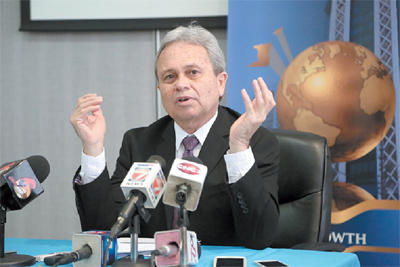(Trinidad Guardian) Government is cracking down on business operators as it moves to ensure compliance with tax regulations, Value Added Tax (VAT) in particular.
The GML Enterprise Desk has confirmed that the Ministry of Finance retained VAT compliance monitors who have been mandated to find out whether established businesses throughout the country are registered or not.
“The officers will be traversing the country—North, South, East and West—to see if businesses are registered or not, asking for their VAT registration and BIR numbers to see if they are complying,” said a source at the Ministry of Finance.
If the VAT compliance monitors are not satisfied with what is presented to them at the respective businesses, they can request an audit be done to determine the level of tax compliance. They will be working closely with field auditors at the Ministry of Finance.
The initiative comes even as government’s tax amnesty to citizens and businesses remain in effect.
The amnesty came into effect on July 1 and is effective until September 16. It applies to income tax payments, corporation tax, business levy and Green Fund levy payments, VAT collections, petroleum tax, as well as annual company returns that were due and payable up to December 2015.
Finance Minister Colm Imbert explained that it gives citizens “the opportunity to honour their tax obligations to the State without penalties and interest accrued over the years.” But he warned that after September 16, “the penalties, interest, further taxes and additional taxes which have been payable will be revived and become payable as if a waiver had not been granted.”

Government is optimistic it would get more than the $500 million, since previous amnesties have proven to be quite successful.
Under the People’s Partnership government there were two tax amnesties, the first was in 2011 under then finance minister Winston Dookeran. That amnesty brought in $1.8 billion to the Treasury. The second amnesty was in 2014 by then finance minister Larry Howai, who had hoped to raise $500 million in taxes. The amnesty eventually brought in close to $800 million.
Meanwhile, several people doing business like hairdressers, taxi drivers, small food and sweet operators, and others doing businesses in their homes who do not pay VAT will continue to remain under the radar for now. The VAT monitors will not be targeting this group at least on this occasion, the Finance Ministry source said.
Creative ways to avoid taxes
Business owners have found creative ways to avoid paying taxes. For example, the owner of a supermarket may have ten cash registers, but two or three of them may not be configured to register VAT. The money collected from those cash registers is not accounted for and as a result, there is a misreporting in their accounts on the level of sales activity done.
Records are falsified and sales are made off the books, so that there is no paper trail of the sales made because no invoice would have been issued for sale of goods or work done.
In some cases, taxes are not levied on goods brought into the country. This is done in collusion with Customs and Excise officers, and the result is that there is potential gain from purchasing imported goods for which you have paid no tax and then sell them with VAT added on.
There are instances where BIR officers audit books and if the business owner owes a substantial amount in taxes, the officer may suggest that the business person make an off-the-book payment (bribe) and the debt would be written off. In other instances, when officers audit their books and offenders are caught, they have to pay the amount owed in addition to the interest and penalties which have accrued over the period.
Meanwhile, some business places are not VAT registered but charge customers VAT.
A source at the VAT office said consumers must always be alert and look for the VAT registration which should be clearly displayed in business places. If it is not and you are asked to pay VAT, then you should ask to see proof that the business is registered. If you are not satisfied, you can report the business owner.
Business operators, on the other hand, said the scope for VAT fraud was affected by the speed with which VAT refunds are paid. Business owners are complaining of being owed thousand of dollars in VAT refund, some for as long as three years, while they must make VAT payments every two to three months. Plus they must pay interest and penalties for late payment, while no interest is paid on outstanding VAT refunds owed to them.
Arjoon said other creative ways which some business owners use to evade taxes include registering their companies in countries that are tax havens. Their earnings are then taxed at a lower rate compared to local taxes.
Another way of evading taxes, according to Arjoon, is by setting up shell companies, that’s a company that exists on paper only. This, he said, is a popular tool used by money launderers to hide their finances and assets from the authorities.
How is VAT paid?
Value Added Tax is due and payable within 25 days after the end of the tax period to which it relates. For example, if the tax period is Tax 1/1/16–28/02/16, then the tax will be due on 25/3/16.
Where the payment is not paid by the due date, the outstanding amount carries a penalty of eight per cent of the amount outstanding and interest at the rate of two per cent (per month or part thereof from the due date to the day of payment).
